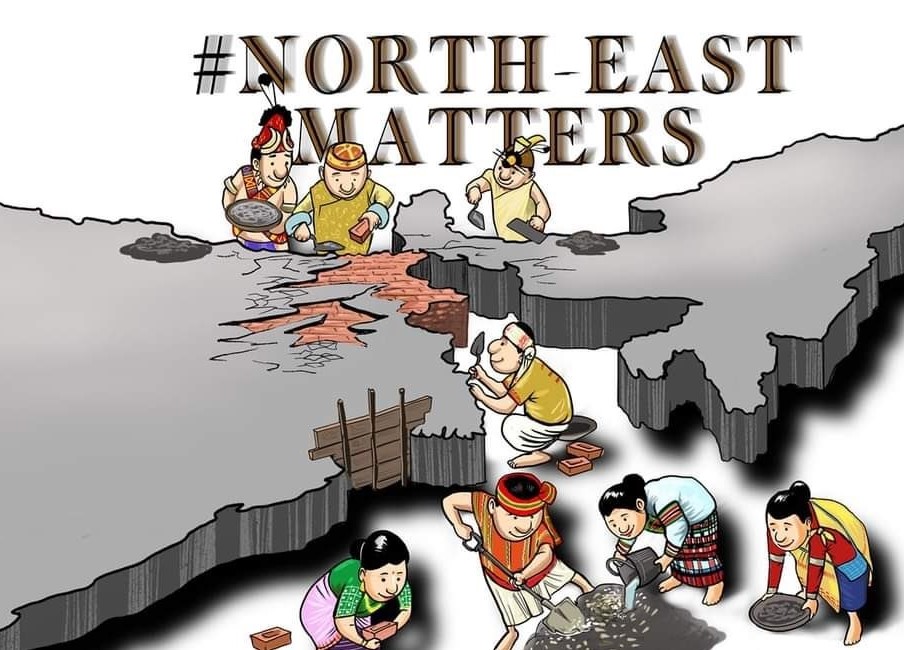The history, culture, and contributions of North East India have long been marginalized and overlooked in the National Council of Educational Research and Training (NCERT) syllabus. This systemic exclusion has had far-reaching consequences, perpetuating widespread discrimination, ignorance, and a distorted national narrative about the region’s pivotal role in shaping India’s diverse identity.
The Absence of North East India in NCERT Curriculum
According to a report in The Indian Express, while the NCERT claims that the region finds “adequate space” in its publications, the reality paints a different picture. The NCERT has published a supplementary textbook titled “North East India – People, History and Culture” in 2017, but this is not part of the core curriculum. As Debonil Baruah, Advisor of the North East Students’ Union (NESU), points out, “the fact is that it is supplementary and not part of the main curriculum. Publishing the reader is well and good, but what’s the point if people are not reading it?”
Discrepancies in Coverage
In 2014, the Ministry of Home Affairs constituted the Bezbaruah Committee to look into the concerns of the people from the Northeast living in other parts of the country, particularly in the wake of the death of a 19-year-old student named Nido Tania in Delhi. The committee, led by M.P. Bezbaruah, made several recommendations, including the integration of Northeastern culture and history into the NCERT curriculum.
The Bezbaruah Committee recognized the lack of representation of the Northeast region in the national education system and the need to address the resulting prejudices and discrimination faced by the people from the region. The committee specifically recommended that the NCERT should incorporate content related to the Northeast’s history, culture, and traditions in its core syllabus and textbooks.
However, despite this recommendation made seven years ago, the NCERT has yet to implement a comprehensive inclusion of the Northeast’s narrative in its main curriculum. The NCERT has published a supplementary textbook titled “North East India – People, History and Culture” in 2017, but this is not part of the core syllabus and remains largely unread by students.

This discrepancy in coverage is particularly stark when compared to the extensive attention given to global events like the Vietnam War and Korean War in the NCERT syllabus. While these international conflicts are covered in detail, the history and contributions of the Northeast region, which is an integral part of India, have been conspicuously absent from the national curriculum.
The lack of representation of the Northeast in the NCERT syllabus has perpetuated a sense of alienation and ignorance among the general public about the region’s rich heritage and its pivotal role in shaping India’s diverse identity. This omission has also fueled prejudices and discrimination against the people from the Northeast, who often face racial slurs and stereotyping in other parts of the country.
According to a survey conducted by the ReachOut Foundation and Policy Research, 54% of people from the Northeast feel that discrimination is a reality in Delhi, with 74% of respondents confirming this perception. The survey also shed light on the locations where discrimination is most commonly experienced by individuals from the Northeast. Around 27% of respondents reported facing discrimination at restaurants, sporting events, or public places, while 24% encountered discrimination in educational institutions, and 23% during buying or renting activities. In terms of the reasons behind discrimination, 63% of respondents attributed the discrimination they faced to their ethnic origin, emphasizing the role of ethnicity in perpetuating discriminatory attitudes and behaviors towards individuals from the Northeast. This data highlights the urgent need for greater awareness, education, and policy interventions to address and combat discrimination against individuals from the Northeast in cities like Delhi and Bangalore.
Lack of Awareness and Knowledge about North East India
The survey results also point to a concerning lack of awareness and knowledge about North East India among the general Indian population. The limited understanding of the region’s history, culture, and contributions exacerbates stereotypes, prejudices, and discriminatory behaviors towards individuals from the Northeast. This lack of awareness underscores the importance of incorporating comprehensive education about North East India in school curricula, public awareness campaigns, and policy initiatives to foster greater understanding, respect, and inclusivity towards the diverse communities from the region.

